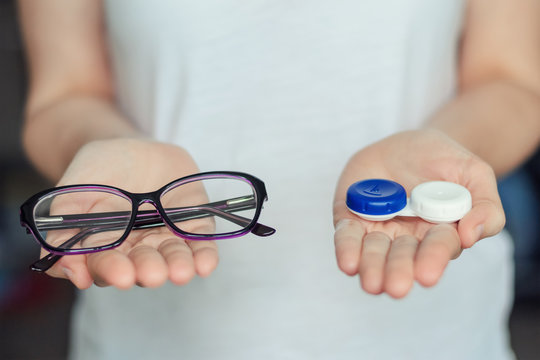What’s better: contact lenses or glasses? This common question has no one answer, as the best option depends on various factors including your lifestyle, vision needs, and personal preferences. Here, we explore the pros and cons of both to help you make an informed decision. Consulting with an optometrist or visiting an eye clinic can provide additional insights tailored to your specific needs.
Overview of Vision Correction Options
There are several types of vision correction methods available today. Glasses and contact lenses are the most popular, but other options include LASIK surgery and orthokeratology (Ortho-K). Understanding the basics of each can help in making the right choice for your vision correction.
Advantages of Wearing Glasses
Glasses offer several benefits for vision and eye health. They provide a barrier against environmental factors such as dust and wind, which can irritate the eyes. Additionally, glasses can be customized with coatings for UV protection, anti-reflective properties, and scratch resistance.
Style and fashion considerations are also important for many people. Glasses come in a wide variety of styles, colors, and materials, allowing you to express your personality and match your look to your wardrobe. They can also be a fashion statement, enhancing your overall appearance.
Advantages of Wearing Contact Lenses
Benefits of contacts for vision and convenience include providing a wider field of view compared to glasses, as they sit directly on the eye and move with it. Contacts are also better suited for physical activities and sports, as they do not get in the way or fall off.
Situations where contacts may be preferred to involve specific activities like playing contact sports, where glasses can be impractical. Additionally, contacts do not fog up or get splattered with rain, making them convenient for various weather conditions.
Challenges of Wearing Glasses
Common problems and inconveniences associated with glasses include discomfort from the weight on the nose and ears, limited peripheral vision, and the need to clean them frequently to remove smudges and dirt. Glasses can also break or get scratched, requiring repairs or replacements.
Addressing the limitations of glasses involves choosing lightweight materials and well-fitting frames to enhance comfort, as well as using protective coatings to extend the lifespan of the lenses. Regular adjustments by an optometrist can also improve the fit and comfort of glasses.
Challenges of Wearing Contact Lenses
Potential issues and risks with contacts include eye infections, dryness, and discomfort, particularly if they are not cared for properly. Contacts require a strict hygiene regimen to prevent complications, and some people may find them challenging to insert and remove.
Addressing the limitations of contact lenses involves following best practices for lens hygiene, such as washing hands before handling lenses, using the correct cleaning solution, and replacing lenses as recommended
Health Considerations
Glasses pose fewer health risks as they do not touch the eyes, reducing the likelihood of infections and other complications. Contacts, while generally safe, require meticulous care to avoid issues like infections and corneal damage.
Hygiene and maintenance requirements differ significantly. Glasses are easy to clean and maintain, while contacts demand a more rigorous cleaning routine to ensure they remain safe and comfortable to wear.
Cost Comparison
Initial costs and long-term expenses vary between glasses and contact lenses. Glasses may have a higher upfront cost but can last for years with proper care. Contacts often involve ongoing costs for lenses, cleaning solutions, and regular replacements.
Insurance and affordability factors should also be considered. Many vision insurance plans cover both glasses and contact lenses, but the coverage amounts, and frequency may differ. Evaluating these factors can help in budgeting for vision correction needs.
Technological Advancements
Recent innovations in glasses and contacts have improved comfort, functionality, and aesthetics. For instance, high-definition lenses in glasses provide sharper vision, and new materials for contact lenses enhance breathability and moisture retention.
Future trends in vision correction may include smart glasses with augmented reality features and contact lenses with built-in sensors for monitoring eye health. Keeping up with these advancements can help you make informed choices about your vision care.
Environmental and Sustainability Factors
Eco-friendly considerations for glasses and contacts involve choosing sustainable materials and practices. For example, some glasses are made from recycled materials, and biodegradable contact lenses are becoming more available.
Sustainability practices in the vision industry include reducing waste through recyclable packaging and promoting the use of eco-friendly products. Being mindful of these factors can contribute to a more sustainable approach to eye care.
Special Considerations for Children
Choosing the best option for kids and teens involves considering factors like durability, comfort, and ease of use. Glasses are often recommended for younger children due to their simplicity and lower maintenance compared to contacts.
Ensuring proper eye care and maintenance for children includes regular eye exams, teaching them how to care for their glasses or contacts, and monitoring their use to ensure they are following recommended practices.
Expert Recommendations
LMC experts’ insights on choosing between glasses and contacts emphasize the importance of individual needs and preferences. They recommend consulting with an eye doctor to determine the best option based on your vision requirements, lifestyle, and eye health.
Personalized advice based on individual needs might include recommendations for specific brands or types of lenses, tips for maintaining eye health, and strategies for transitioning between glasses and contacts.
Conclusion
Both glasses and contact lenses have their advantages and challenges, and the best choice depends on your personal preferences, lifestyle, and vision needs. Consulting with an LMC optometrist near me or visiting our eye clinic close to me can help you make an informed decision for optimal eye health. At LMC, our experts are here to provide personalized advice and the latest in vision correction options to ensure you see clearly and comfortably. Schedule an appointment with us today and discover the best solution for your vision needs.



